#Quan Yi Lun
Explore tagged Tumblr posts
Text



Blossom | If I hadn't meet you, my life would be nothing but mediocre. There's no need to feel sorry for me.
#Seeing him makes me want to rewatch An Ancient Love Song all over again#blossom#cdrama#quan yilun#character: wu shan#quan yi lun#blossom aesthetics
113 notes
·
View notes
Text
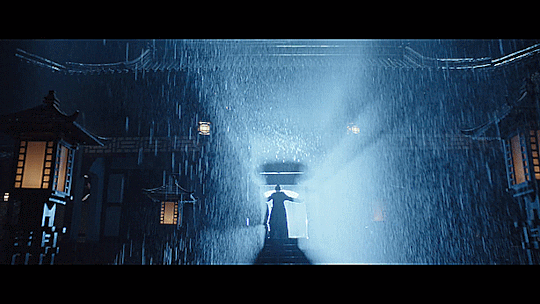
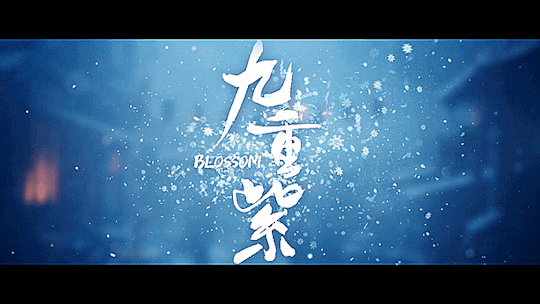
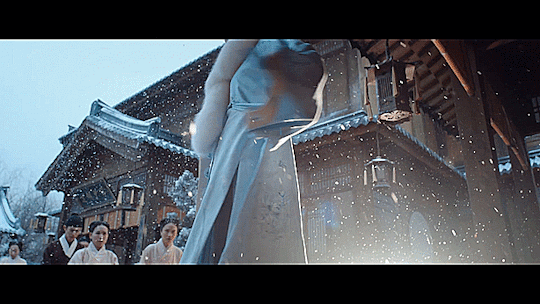
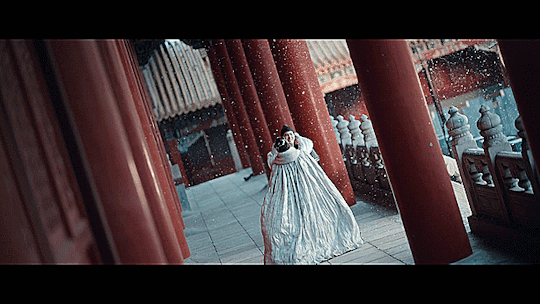
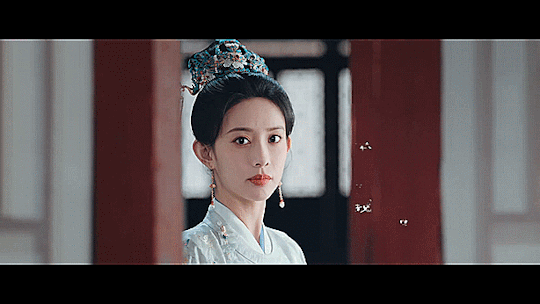
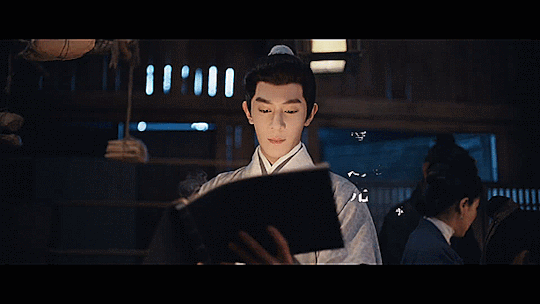
Cdrama: Blossom (2024)
Trailer 【九重紫 | Blossom】 首支片花——孟子义李昀锐珠沉玉碎入轮回
Watch this video on Youtube: https://www.youtube.com/watch?v=G6YT1SlbVig
#Blossom#九重紫#Jiu Chong Zi#2024#Tencent Video#youtube#cdrama#chinese drama#trailer#avance#Meng Zi Yi#Li Yun Rui#Snow Kong#Xia Zhi Guang#Li Bai Hui#Yan An#Quan Yi Lun#Liu Mei Tong#Zhu Jun Lin
18 notes
·
View notes
Text
Please let there be a live-action “Thousand Autumns/Qian Qiu” and cast as Shen Qiao the beautiful Quan Yi Lun-全伊倫 🥰



#Quan Yi Lun#全伊倫#thousand autumns#thousand autumns vol 2#qian qiu#meng xi shi#shen qiao#daoism#daoist
9 notes
·
View notes
Photo
guess who just went berserk 😊❤️🔪
"under the setting sun, their sillhouettes gradually become one."
hey screenwriter i dont know what ur trying to imply but if its what im thinking i wont hesitate to yeet myself to the sun, sunset is gay now.
also theres no ep 37. this is the official end scene for killer and healer bye. what is blood? what is wanting to eat tangyuan with you but im tired i want to sleep? idk them.
also op, thank you so much for translating it makes much more sense now. not all heroes wear cap, my greatest respect for you. heres some cookies 🍪🍪🍪










I translated the fix-it ending from the screenwriter of the show. [Source here]
I’m neither a native speaker of English nor Chinese, and am also not good with words. But this ending is so perfect that I wanted to try my best to share with you all. It is from the screenwriter, so it’s canon in my mind. And I personally think you can’t ask for a better ending than this. I hope this makes you feel just as happy as it did for me. I had a smile on the whole time I was reading / translating it. :)
(PS: Audio drama please outdo this if you can.)
(PSS: This was written in movie-script format. Colored lines are dialogs, for your convenience.)
(PSSS: Might go back to check for errors later. I’m almost dead.)
#killer and healer#恨君不似江楼月#chen yuzhi#jiang yuelou#zhan junbai#yu tangchun#mao ji zun#ian yi#yi po chen#chen yu cheng#quan pei lun#IM SCREECCCHHHIINNNGGG LIKE AN UGLY ALIEN WHAT THE FUCKKK#WHATTHEFUFUFFFUFFUFFFUF#im actually tearing up???????#bye
339 notes
·
View notes
Text
Danmei Roundup
I suddenly realized that ever since MDZS opened the doors, I’ve steadily gone through a good amount of danmei. 👀 Since I’m apparently doing anything except write my final paper, I compiled a list of stories I’ve come to know either through their novels or audio drama adaptations (or both). Any of them look familiar? lol
Adding/updating the list as I go + highlighting some of my favs.
Period Fantasy: Wuxia, Xianxia
人���反派自救系统 — 墨香铜臭 (Scum Villain’s Self-Saving System — Mo Xiang Tong Xiu) *system/transmigration*
魔道祖师 — 墨香铜臭 (Grandmaster of Demonic Cultivation — Mo Xiang Tong Xiu)
天官赐福 — 墨香铜臭 (Heaven Official’s Blessing — Mo Xiang Tong Xiu)
铜钱龛世 — 木苏里 (Copper Coins — Mu Su Li)
二哈和他的白猫师尊 — 肉包不吃肉 (Dumb Husky and His White Cat Shizun — Meatbun Doesn’t Eat Meat)
Sci-Fi/Survival (? idk what 无限流 is called)
全球高考 — 木苏里 (Global Examination — Mu Su Li)
地球上线 — 莫晨欢 (The Earth is Online — Mo Chen Huan)
Modern Setting
Crime/Mystery
犯罪心理 — 长洱 (Criminal Psychology — Chang Er)
默读 — Priest (Silent Reading — Priest)
破云 — 淮上 (Breaking Through the Clouds — Huai Shang)
皮囊 — 潭石 (Skin — Tan Shi)
Gaming
你师父我人傻钱多 — 莫晨欢 (Your Shifu is Stupid Rich — Mo Chen Huan)
网恋翻车指南 — 酱子贝 (How to Fail at Online Dating — Jiang Zi Bei)
你亲我一下 — 引路星 (Give Me a Kiss — Yin Lu Xing) *celebrity*
Schoolyard Romance
我喜欢你的信息素 — 引路星 (I Like Your Pheromones — Yin Lu Xing) *abo*
伪装学渣 — 木瓜黄 (Fake Slackers — Mu Gua Huang)
信息素说我们不可能 — 毛球球 (The Pheromones Say We've Got No Chance — Mao Qiu Qiu) *abo*
Celebrity/Entertainment Business
我嗑了对家X我的CP — PEPA (I Ship My Adversary x Me — PEPA)
情敌每天都在变美 — 公子于歌 (My Love Rival is Getting Prettier Every Day — Gongzi Yu Ge) *system/transmigration*
我只喜欢你的人设 — 稚楚 (I Only Like Your Persona — Zhi Chu)
营业悖论 — 稚楚 (Fanservice Paradox — Zhi Chu) *boy group*
小行星 — 微风几许 (Little Asteroid — Wei Feng Ji Xu) *abo*
落池 — 余酲 (Falling Into the Pond — Yu Cheng)
迪奥先生 — 绿野千��� (Mr. Dior — Lv Ye Qian He) *crack/amnesia*
职业替身 — 水千丞 (Professional Body Double — Shui Qian Cheng) *rebirth*
没钱 — 吕天逸 (Broke — Lv Tian Yi) *system/supernatural*
营销号说你喜欢我 — 螽斯 (Clickbait Media Accounts Say You Like Me — Zhong Si)
Supernatural/Fantasy
论以貌取人的下场 — 月下蝶影 (The Consequences of Judging a Book by Its Cover — Yue Xia Die Ying)
我开动物园那些年 — 拉棉花糖的兔子 (Those Years I Opened a Zoo — La Mian Hua Tang de Tu Zi) *system*
临时保镖 — 绿野千鹤 (Last-Minute Bodyguard — Lv Ye Qian He)
Slice-of-Life/Other
飞鸥不下 — 回南雀 (Flying Gulls Never Land — Hui Nan Que) *adopted brothers*
安知我意 — 北南 (Know My Heart — Bei Nan)
刺青 — 不问三九 (Tattoo — Bu Wen San Jiu)
燎原 — 不问三九 (Wildfire — Bu Wen San Jiu)
烧不尽 — 回南雀 (Eternal Burning — Hui Nan Que)
腹黑和腹黑的终极对决 — 羲和清零 (Behind the Scenes Hunter — Xi He Qing Ling) *corporate battle*
… … …
And then there are some more I started to various extents:
这题超纲了 — 木瓜黄 (Beyond the Outline — Mu Gua Huang) *schoolyard*
不要在垃圾桶里捡男朋友 — 骑鲸南去 (Don’t Pick Up Boyfriends from the Trash — Qi Jing Nan Qv) *transmigration/system*
魔尊也想知道 — 青色羽翼 (Mo-Zun Also Wants to Know — Qing Se Yu Yi) *period fantasy/system*
可爱过敏原 — 稚楚 (Adorable Allergen — Zhi Chu) *schoolyard/adopted brothers*
欢迎来到噩梦游戏 — 薄暮冰轮 (Welcome to the Nightmare Game — Bo Mu Bing Lun) *sci-fi/transmigration/survival?*
恶性依赖 — 金刚圈 (Unhealthy Attachment — Jin Gang Quan) *modern*
营养过良 — 芥菜糊糊 (Nutrition Overload — Jie Cai Hu Hu) *cats*
S.C.I. 谜案集 — 耳雅 (S.C.I. Mystery — Er Ya) *crime/mystery*
嚣张 — 巫哲 (Audacious — Wu Zhe) *schoolyard*
穿成反派总裁小情人 — 林盎司 (Transmigrated as the Villain CEO’s Little Lover — Lin Ounce) *transmigration/entertainment business*
一不小心和醋精���婚了 — 一枚纽扣 (My Accidental Husband is Full of Vinegar — Yi Mei Niu Kou) *modern*
碎玉投珠 — 北南 (Sui Yu Tou Zhu — Bei Nan) *80s/90s setting*
兼职无常后我红了 — 拉棉花糖的兔子 (After I Started Working as a Wu Chang, I Became Popular — La Mian Hua Tang de Tu Zi) *modern/supernatural*
新时代,新地府 — 林知落 (New Times, New Hell — Lin Zhiluo) *supernatural/modern/crack*
两A相逢必有一O — 厉冬忍 (When Two As Meet, There Must Be One O — Li Dong Ren) *abo/schoolyard*
破云2:吞海 — 淮上 (Swallow the Sea — Huai Shang) *crime/mystery*
152 notes
·
View notes
Note
Ji ji fu ji ji
a o e i i er ai ei ao ou an en ang eng ong i ia iao ie iu ian in iang ing iong u ua uo uai ui uan un uang ueng ü üe üan ün a o e er ai ao ou an en ang eng yi ya yao ye you yan yin yang ying yong wu wa wo wai wei wan wen wang weng yu yue yuan yun b ba bo bai bei bao ban ben bang beng bi biao bie bian bin bing bu p pa po pai pei pao pou pan pen pang peng pi piao pie pian pin ping pu m ma mo me mai mei mao mou man men mang meng mi miao mie miu mian min ming mu f fa fo fei fou fan fen fang feng fu d da de dai dei dao dou dan den dang deng dong di diao die diu dian ding du duo dui duan dun t ta te tai tei tao tou tan tang teng tong ti tiao tie tian ting tu tuo tui tuan tun n na ne nai nei nao nou nan nen nang neng nong ni niao nie niu nian nin niang ning nu nuo nuan nü nüe l la le lai lei lao lou lan lang leng long li lia liao lie liu lian lin liang ling lu luo luan lun lü lüe g ga ge gai gei gao gou gan gen gang geng gong gu gua guo guai gui guan gun guang k ka ke kai kei kao kou kan ken kang keng kong ku kua kuo kuai kui kuan kun kuang h ha he hai hei hao hou han hen hang heng hong hu hua huo huai hui huan hun huang z za ze zi zai zei zao zou zan zen zang zeng zong zu zuo zui zuan zun c ca ce ci cai cao cou can cen cang ceng cong cu cuo cui cuan cun s sa se si sai sao sou san sen sang seng song su suo sui suan sun zh zha zhe zhi zhai zhei zhao zhou zhan zhen zhang zheng zhong zhu zhua zhuo zhuai zhui zhuan zhun zhuang ch cha che chi chai chao chou chan chen chang cheng chong chu chua chuo chuai chui chuan chun chuang sh sha she shi shai shei shao shou shan shen shang sheng shu shua shuo shuai shui shuan shun shuang r re ri rao rou ran ren rang reng rong ru rua ruo rui ruan run j ji jia jiao jie jiu jian jin jiang jing jiong ju jue juan jun q qi qia qiao qie qiu qian qin qiang qing qiong qu que quan qun x xi xia xiao xie xiu xian xin xiang xing xiong xu xue xuan xun
13 notes
·
View notes
Text





Handsome Man in Ming Dynasty Hanfu
Hanfu Model: Quan Yi Lun
134 notes
·
View notes
Video
youtube
Dance Party with Ian Yi, Chen Yu Cheng & Quan Pei Lun. They are all so adorable ~ Tati
5 notes
·
View notes
Text
💗 My Asian Man Crushes ❣️
🇰🇷
• Jung Il Woo
• Na In-Woo
• Woo-sik Choi
• Lee Sang Yeob
• Cho Seung-woo
• Park Sung-woong
• Joo Won
• Woo Do Hwan
• Go Soo
• Han Suk-Kyu
• Yoon Shi-yoon
• Yoo Min-Kyu
• Yeo Jin-Goo
• Kim Jisoo
🇯🇵
• Yokohama Ryusei
• Yuki Yamada
• Tadanobu Asano
• Ryo Narita
• Kaneko Daichi
• Takasugi Mahiro
• Hayato Isomura
• Murakami Nijiro
♍️ My C Ultimate Men ❤️🔥
• Li Chung Lin
• Zhang He
• Yu Cheng En
• Li Fei
• Wang Hao Ge
• Xiao Kai Zhong
• Wang Hao Xuan
• Qin Junjie
🧚🏻 My Heart & Soul 🥷🏻
• Zhang Yi Jie
Oh My Fukking Gosh 🔥⚡️💫
• Chang Hua Sen
• Ci Sha
• Wang Hong Yi
Forever Devoted to U 🫰🏻
• Zhu Zan Jin
• Zhang Xiao Chen (รักนะจุ๊บๆ)
Damn Boi…🫨🤒
• Hei Ze
• Li Ruo Tian
• Gao Yang
Adore U Madly 😤🥺
• Qiao Zhen Yu (🥹)
You bewitched me 🫠
• Zhang Wan Yi
• Yang Xu Wen 🤧
Broke my rules for U 😤
• Guo Jia Nan
• Yuan Zi Ming
• Liang Yong Qi
I kinda like you a lot 😗
• Zhou Jun Wei (อรุ่มเจ๊าะ)
• Li Jiu Lin (ท่านชาย…)
• Yan Zi Xian
Slowly Sink into You 😷
• Xia Zhi Guang
• Zeng Shun Xi
• Wei Zhe Ming
🧝🏻♂️ Fascination 🫰🏻
• Liu Xue Yi
• June Wu
• Li Yun Rui
• Xia Zhi Guang
• Jing Chao
• Ji Chen
• Deng Kai
• Wang Zu Yi
Oh Boy….🥹...!?
New Entry 🎯
🔆 C interested 🔆
• Quan Yi Lun
• Chen Zhe Yuan
• Zhu Yi Long
• Dylan Wang
• Qu Chu Xiao
• Chen Fei Yu
• Wang Rui Chang
• Wang Xing Yue
• Zhang Hao Wei
• He Feng Tian
Always support 😎
• Daniel Wu
• Mark Chao
• Wang Zhuo Cheng
• Hu Ge
• Chang Chen
• Karry Wang
• Ethan Juan
• Wang Duo
• Wu Xiubo
Papi ..!?
• Peter Ho
• Li Ze Feng
• Qin Hao
• Zhou Lu La
👊🏻 Big Fan ✊🏻
• Yang Hui Xiang
• Yang Yang
• Fu Xin Bo
• Zhu Ya Wen
• Chen Kun
• Chen Yi
Imma Fan of you sirs 🤘🏻
• Luo Jin
• Cheng Yi
• Lei Jia Yin
• Eddie Peng
• Zhou Ting Wei
• He Feng Tian
• Xu Zheng Xi
• Gong Jun
• Lu Fang Sheng
10 notes
·
View notes
Text





Moonlight Mystique | Ling Long x Rong Xian
#it's always the elders who think they know better#cdrama#quan yi lun#character: rong xian#白月梵星#moonlight mystique#aesthetics#pan jun ya#character: ling long
47 notes
·
View notes
Text








Cdrama: Blossom (2024)
Gifs of Intro of cdrama "Blossom"
ENG SUB 【九重紫 | Blossom】 EP01 —— Rebirth and Revenge: Meng Ziyi & Li Yunrui's Fateful Journey
Watch this video on Youtube: https://www.youtube.com/watch?v=wWPWW_ouRBY

#Blossom#九重紫#Jiu Chong Zi#2024#Tencent Video#WeTV#youtube#cdrama#chinese drama#1st episode#first episode#Meng Zi Yi#Li Yun Rui#Snow Kong#Xia Zhi Guang#Alina Zhang#Yan An#Li Bai Hui#Liu Mei Tong#Shang Qi#Li Xin Ze#Quan Yi Lun#Zhu Jun Lin
5 notes
·
View notes
Text
Before the War of Eight Kings, Part 1
Just posting this to get it out of the way, I didn’t even manage to get to the death of Emperor Wu. Opinions are my own. I make no excuses.
King vs. Prince
The earliest Chinese rulers were called wang 王, as a hereditary ruler of an independent state, the most obvious translation of 王 is “King”. Later on, at the end of the Warring States era, the 王 of Qin conquered all the other Chinese kings, and invented a new title for himself, huang-di皇帝, which is usually translated “Emperor”. Qin was destroyed just a few decades later by an alliance of rebel generals who again took the title of 王 for themselves. In the end, the 王 of Han conquered the other 王, and declared himself Emperor. He made his sons 王 to rule over various conquered territories as vassals to the Emperor. Later Emperors continued to give out this title to their sons, but over time all their powers were stripped away. So basically what happened was that the Emperor sent away all his sons, except the heir to the throne, to pretend to rule over territories actually governed by officials appointed by the Emperor. It is actually quite similar to modern European royal families. The Duke of Sussex doesn't actually rule over Sussex. For these people translating 王 as “King” doesn't really fit that well, which is why “Prince” is often used as well. But at the same time rulers of foreign states continued to be called 王. The issue is further confused by a third use of the title, as a stepping stone to declaring yourself Emperor. At the end of Han, Cao Cao, Sun Quan and Liu Bei three at various stages took the title of 王. One of the privileges of being an amateur is that you can do what you like, so I have decided to always translate 王 as King. Create Assembly has chosen to use Prince. But you should know that it really exactly the same word, it is just a choice of translation. War of the Eight Kings
The Book of Jin is a history book written in the early 7th century, based on earlier now mostly lost books. It covers the history of the Western and Eastern Jin empires from 266 to 420 AD, and is divided into 130 Scrolls (or “Chapters”). From 291 to 306. the ruling family of the Western Jin Empire tore itself apart in a series of internal conflicts, eventually ending with the full collapse of the empire. Scroll 59 of the Book of Jin has biographies for the eight members of the Jin imperial family that had leading roles in these conflicts: Sima Liang, King of Runan (d. 291) Sima Wei, King of Chu (b. 271, d. 291) Sima Lun, King of Zhao (d. 301) Sima Jiong, King of Qi (d. 302) Sima Ai, King of Changsha (b. 277, d. 304) Sima Ying, King of Chengdu (b. 279, d. 306) Sima Yong, King of Hejian (d. 306) Sima Yue, King of Donghai (d. 311) Because of that, the whole time period has become know as the “War of Eight Kings”, but this is not really a very accurate description. First of all, all eight kings were never active at the same time, the youngest ones were just kids when the first ones got killed. It was also not just one war, but rather a series of palace coups, which escalated into a series of short civil wars, which escalated into a big messy civil war and general rebellion. I sometimes call the period for the “Jin civil wars”. War of Eight Kings sounds much cooler though. Rise of the Sima clan, reign of Emperor Wu I won't go into too much detail here on the rise to power of the Sima clan, and their takeover of of the Wei empire, the most of powerful of the Three Kingdoms. Sufficient to say, is that in 249 Sima Yi, one of Wei's leading generals and statesmen, and co-regent to the Emperor, launched a coup to effectively take control of the government of Wei. When Sima Yi died in 251, power passed to his oldest son, Sima Shi. And when Sima Shi died without sons in 255, power passed to his younger brother Sima Zhao. By the end of 260 Sima Zhao had done away with the last of his rivals, and installed a puppet emperor of his own choosing. In 263 his generals conquered Shu and Liu Shan's Han empire. On 2 May 264 he was granted the title King of Jin. Sima Zhao died 6 September 265. Sima Zhao was inherited by his oldest son Sima Yan, who quickly went through the final steps to replacing Wei, like Wei had previously replaced Han. The final Emperor of Wei abdicated 4 February 266, and on 8 February Sima Yan formally ascended the throne as Emperor of Jin. He has become best known under his posthumous title Emperor Wu – the “Martial Emperor”. Views on Emperor Wu is usually reduced to someone who indulged himself with a massive harem, while instituting policies that would eventually doom his empire. But compared to his predecessors, his almost 25 year long reign was a hallmark of stability. While court intrigues were sometimes quite fierce, in the end there were no political executions. And in 280 Jin's generals quickly overwhelmed Sun Hao's Wu empire in a massive invasion that reunited most territories of the old Han empire. Position of the Sima princes within the empire First the Han and then the Wei Emperors had kept their relatives out of political power, and instead sent them away with empty noble titles. This had the benefit of stopping them from interfering in the government and challenging the Emperor's authority. But it had the big downside of isolating the Emperor from his natural allies against takeovers from outside the imperial family. This meant that if the Emperor was a child, or otherwise incapable or uninterested in ruling, there was a power vacuum waiting for an outsider to fill. During the Han, the court had often been dominated by the Empress' family. During Wei nobody had been able to stop the Sima family from taking over. It turned out that while all the officials of course professed their absolute loyalty to the Emperor, most of them did not really mind someone not the Emperor being actually in charge. Based on these lessons, Emperor Wu decided to deeply involve his family in running the empire. First of all, at the beginning of his reigns he gave all his male relatives the Sima clan titles as kings. All descendants of his great grandfather Sima Fang were included. Sima Fang had eight sons, Sima Yi had nine sons, and Sima Zhao also had nine sons. So altogether there were quite a lot of them. I will try to include small family trees with those who become relevant.Having made his relatives Kings, Emperor Wu then also increased their privileges compared to what imperial relatives had enjoyed during Han and Wei. He gave the some say in appointments to their fiefs, the right to a personal armed guard, and let them stay in the imperial capital at Luoyang rather than requiring them to go and look after their fiefs, but most importantly he gave them important appointments at court and command of armies in the field. Sima Liang's political power did not come from his title as the notional King of Runan, but the important offices he held, and because he was the Emperor's trusted granduncle. Sima Zhong becomes Heir Emperor Wu had altogether twenty-six sons, but only nine survived to adulthood. His first wife was Yang Yan from the prestigious Yang clan of Hongnong. They had three sons, all born before he became emperor. The oldest died young, but the two others survived, these were Sima Zhong (b. 259) and Sima Jian (b. 262). When at the founding of Jin, Emperor Wu made Yang Yan his Empress, and almost exactly a year later, on 4 February 267, he formally established Sima Zhong as his heir to the throne. Sima Zhong was then seven or eight years old. On 2 April 272 Sima Zhong was married to Jia Nanfeng (b. 257), daughter of Jia Chong (d. 282), one of the most prominent men in the empire. Sima Zhong was then twelve or thirteen years old, she was two years older. In theory, the Emperor, as an autocrat with absolute power, could designate whoever he wanted as heir to the throne, but culturally the expectation was that the Emperor's oldest son with his Empress should inherit. There had not been a regularly appointed heir since Cao Rui. Quickly designating his oldest son as the heir signalled that the Jin empire would be run along orthodox lines. There was also the general fickleness of life to consider. Life expectancy in the 3rd century was much shorter than it is today, and mortality at all ages was much higher. There was no guarantee Emperor Wu would live to see his children grow up. Having an heir already in place, whose legitimacy was unassailable and who was connected by marriage to one of the leading families of the times, should have left the succession a settled question.
16 notes
·
View notes
Photo


Quan Pei Lun finished filming with “Ru Yi Ke Zhan” Source: 权沛伦 (weibo) ~ Tati
1 note
·
View note
Text
The MALineage Project Site
The Martial Arts Lineage Project website had attempted to collect lineage history and details of any martial art or person; unfortunately it is not always accessible; it partially appears on its Facebook site.
Martial Arts Lineage Project-1 http://www.malineage.com/styles/Liuhebafaquan http://www.malineage.com/node/16502/edit
Philosophy Submitted by: dr_k_conor
There exists four 'documents', each carrying traits of history and philosophy principles that are generally presented to explain and teach LiuHe BaFa and boxing. The First I will call the 'Cave Codex' alledgedly from found within a Mt. Hua Yo Shan 華嶽山 grotto 洞. Note that the Taoist Canon is divided into three dong 洞, "caves", "grottoes". The Second is usually called the 'Five Word' verses or 'songs' 拳學 五字 歌訣; these are generally refered to as: quan2 xue2, 拳學, boxing knowledge in verse format, wu3 zi4 五字 5-character-word in length, and ge1 jue2 歌訣 'secret' verses of farewell.[this is often mistranslated as 'song'] The 'said' author is given as Li, 'East-wind' 李東風 Li Dong-feng whose name does not appear in any archaic Song Dynasty document. However, some LHBF student place great value in them. The Third 'document' the actual exercise names, for the Nanjing 66-form series of Wu Yi-hui 六十六 起式 easily can be seen as differing and each form naming demonstrates the academic proficiency of Wu as a man of the arts. Some of the 66-lines of 5-characters each also includes Chinese idioms and references to history, art, and music. http://www.silkqin.com http://waterspirit6x8.tripod.com/id11.html
The Fourth 'document' collective are the commentaries written from various teachers to explain via verses; there are either simple two-word idioms, or longer 5 or seven word explanations.
The Six Combinations [also called 'harmonies' as unified concordances], LiuHe 六 合 are as follows: >1. bodys' structure harmonizes with the minds' awareness, >2. minds' awareness harmonizes with innate 'intent', >3. intent harmonizes with the chi (energy-flow), >4. chi harmonize with the 'spirit', >5. spirit harmonizes with 'motion', >6. motion harmonizes with the 'everywhere', [ Note: that there are actually seven factors, Ti, Xin, Yi, Qi, Shen, Tung, Kung. ]
The Eight Methods [also called 'laws' or regulations], BaFa 八法 are as follows: >1. Qi-Fa =Flow: Move the chi and concentrate the spirit >2. Ku-Fa =Bone: Genuine-structural energy when bones are correct >3. Hsing-Fa =Form: Shapes exchange freely, follow a model, pantomime >4. Sui-Fa =Following: Flexible, adaptable, and coordinated in union >5. Ti-Fa =Lifting: Lift the head upward as if suspended from space >6. Huan-Fa =Reversal: The interchange of motions reverses and reciprocates >7. Le-Fa =Limit: Restraint is needed to harness the dynamic forces >8. Fu-Fa =Hidden: The intrinsic force arises from natural obscurity without method. http://waterspirit6x8.tripod.com/id11.html http://waterspirit6x8.tripod.com/id55.html
One of the often addended 'Fourth Document' ideas, is not from LiuHe BaFa at all, they are from late 1800's to 1900's codification of bodily anatomy often used in the zhan zhuang 站樁 'standing post' of Yi quan 意 拳 from Wang Xiang-zhai who was 'friendly' and respectful to Wu and also from some teachers of Ba-kua-palming. These are often unnecessary and may also be misleading. http://waterspirit6x8.tripod.com/id12.html A more relevant added teaching is from Huang Shou Ting, 黃手庭 of the Shanghai Wu Shu Association, who studied with Song Guang-yu 宋关羽 in Xu Shou; he discusses 8-physical aspects differently : > Qi-Luo: 起 : 落 rising + falling > Dong-Jing: 動 : 靜 moving + stillness > Jin-Tui: 進 : 退 advance + retreat > Kai-He: 開 : 合 open + close > Yin-Yang: 陰 : 陽 in+out, soft+hard > Xu-Shi: 虛 : 实 empty + full > Wa-Qiao: 跃 : 远 jumping + bridging > Liu-He: 六 : 合 internal six-pairs in harmony http://waterspirit6x8.tripod.com/id11.html
Waterspirit6x8 Teachings; http://waterspirit6x8.tripod.com/id11.html Liuhebafachuan; http://www.liuhebafachuan.com/ Liuhebafa verses; http://trinity.psnw.com/~dlmurray/6h8m1.html
Martial Arts Lineage Project-2 http://www.malineage.com/styles/Liuhebafaquan http://www.malineage.com/node/16502/edit
LiuHe BaFa quan Submitted by: dr_k_conor LiuHeBaFa, LiuHe BaFa, Lok Hop Pat Fat, Six-harmony, Eight-methods Boxing Exercise http://waterspirit6x8.tripod.com/id37.html LiuHe BaFa 六合八法 is a collective of martial concepts and boxing exercises. http://waterspirit6x8.tripod.com/id21.html LiuHe BaFa 六合八法 is also a collective of verse of concepts, the Six Harmonies 六合, obtainable by an understanding the utilization of Eight Methods 八法; each aspect is derived from archaic Chinese exercises and pugalisms. The LiuHe BaFa boxing is not directly derived from the modern versions of Tai-chi-, Xing-yi-, or Ba-kua-palm boxing. http://waterspirit6x8.tripod.com/id11.html The verse name is often abbreviated in non-Chinese as LHBF or LHPF. The core concepts and methods of the LiuHe BaFa are known to be derived from the 1900's manchurian Wu Yi-hui 吴翼翚 (1887-1958) who learned them from three differing teachers; Wu first taught them in Shanghai and later at the Nanjing National College of Martial Arts founded in 1928 and later became the Dean of Studies in 1936 [closed 1948].
Although many exercises and concepts are claimed to be from the real-life Song Dynasty Court Taoist Chen Tuan [ Bo ] 陳摶 , aka Chen Xi-yi 陳希夷 [d. 990] who was associated with the military General whose abilities made him the First Emperor of Song, Tai-zu, there exists no official or other records to support the common claim that the LiuHeBaFa- or its principle 'water' flowing or its' verse principles factually originated from the Court Taoist Chen Bo nor from his said mountain residence at Mt. Hua Yu 山 華嶽 in Shenxi Province. http://waterspirit6x8.tripod.com/id9.html
Popular naming has resulted in addending the syles' name to include this mythology: as the Chen Xi-yi Men 'sect' 華嶽希夷門 Hua Yue Xi-yi with LiuHeBaFa Boxing principles becoming: 華嶽 希門 (+) 六合八法拳.
The bonefide utility of the core LHBF verses, is that they are succinct and are applicable to all of other Chinese Internal martial arts. Although form and principle aspects of these internal martial arts [Tai-chi-, Xing-yi-, and Ba-gua-] are evident in the LHBF, there is a popular trend to classifiy the LHBF exercise as a 'fourth' art which it is not; the Chinese Martial Arts Association classifies it as a sub-style of Tai-chi-boxing. Perhaps in keeping with this method of distinction, some teachers have named their styling as a Hua-Yu Tai Chi-boxing exercise. http://waterspirit6x8.tripod.com/id58.html
There also now exists absorption of Yi-chuan, 'intuition' boxing fundamentals as set forth by founder Wang Xiang-zhai 王薌齋, (1886-1963), and his students in the LHBF system; this again results in further name changes and ,mixings with the applications of LiuHeBaFa-. http://waterspirit6x8.tripod.com/id5.html Wang Xiang-zhai is known to have interacted and cross traded to other system styles while he was a teacher at the Nanking Martial Academy [Shao-lin, tai-chi, xing-yi, etc].
To further complicate understanding, Wu Yi-hui, from his earliest martial studies, learned a shaolin-related boxing called Lu Hong Ba Shih 呂紅八勢 sometimes also called Lu Hong boxing 呂紅拳. A careful study of Wu's 66-form version made during his time in Nanjing, does shows evidence of being embedded. The LHBF core exercises are called zhu zi 築基. http://waterspirit6x8.tripod.com/id52.html
LiuHeBaFaQuan; http://waterspirit6x8.tripod.com/ Liuhebafachuan; http://www.liuhebafachuan.com/ Lu Gui-yao, Chin Wo Athletic Assoc, Foshan PRC; http://www.liuhebafa-lgy.com/ Wu Ying-hua, S. China Institute Huainan, Anhui PRC; http://lhbflm.com/index.asp Kam Tung, LHBF Academy,Hong Kong; http://www.liuhebafa.com.hk/ Liu Xiang-ling, Takoma PK, MD, USA; http://wudanglongmen.com/form.html
Martial Arts Lineage Project-3 http://www.malineage.com/node/16502/edit
Informational Links
Google Search https://www.google.co.th/search?q=Liuhebafaquan&gws_rd=cr&ei=t8wAWOrkFcjovgTHw4-ICA 六合八法拳 六合八法拳 pdf 六合八法拳技 六合八法拳 金童 六合八法拳 金彤
Related Books Related Videos
Related People Style: Liuhebafaquan; http://www.malineage.com/styles/Liuhebafaquan Martial Artist: Wang Xiangzhai; http://www.malineage.com/martial-artists/Wang-Xiangzhai Style: Yao's Modern Yiquan; http://www.malineage.com/styles/Yaos-Modern-Yiquan Links; http://www.malineage.com/styles/Liu-He-Ba-Fa-Chuan-nid26156 Teacher; http://www.malineage.com/martial-artists/Wu-Yi-Hui http://www.malineage.com/martial-artists/Li-Dao-Li http://www.malineage.com/martial-artists/Liang-Qi-Zhong http://www.malineage.com/martial-artists/Liang-Zipeng http://www.malineage.com/martial-artists/Moy-Lin-Shin http://www.malineage.com/martial-artists/Li-Chung http://www.malineage.com/martial-artists/Huang-Wei-Lun > https://www.google.co.th/?gws_rd=ssl#q=Huang+Wei+Lun > http://slantedflying.com/master-wei-lun-huang-passes-away/
http://www.malineage.com/styles/Liuhebafaquan?section=schools http://www.malineage.com/styles/Liuhebafaquan?section=videos http://www.malineage.com/styles/Liuhebafaquan?section=photos http://www.malineage.com/styles/Liuhebafaquan?section=history http://www.malineage.com/styles/Liu-He-Ba-Fa-Chuan
2 notes
·
View notes
Text
Just for those who can't see it
Noted:this have crossover ships,so no hate
Is from the rp me & @nova-blues did-
Sd Gundam World Next Gen
Tian Ba-Shirogane Family
Parents:Cao Cao Wing Gundam x Makoto Z Gundam(magnum ace)
Souhi-Gundam Fenice Rinascita
Souhan-Gundam Lightning Z Gundam
Souji-Gundam Wing Zero Hōnoo
Soujiro-Gundam Legilis
Parents:Shigeo Shining Break Gundam(fighter spirits) x Jurouta Gundam Airmaster
Itsuki-Gundam Airmaster
Mashiro-Gundam X Maoh
Parents:Akino Aile Strike Gundam x GZ Galbaldy Rebake x Garrett Byarlant Z Gundam
Glacier-V2 Gundam Ka
Kumoki-Aile Strike Gundam
Yukio-strike Gundam
Liu-Sun Family
Parents: Liu bei unicorn gundam x Sun quan Astray Gundam
Sun Wukong-Impulse Gundam(adopted)
Sun Liu Yongqi-Sengoku Astray Gundam
Sun Liu Jia Li-???
Sun Liu Shan-Astray Red Frame Gundam
Parents:Sun Ce x Zhou Yu
Sun Shao-Blue Frame Astray Gundam
Zhou Yin-Hyaku Shiki Gundam
Parents:Sun ShangXiang x ???
Sun Ying-Strike Rouge Gundam
Other parents
Parents:Zhuge liang freedom gundam x Arsene Gundam x
Zhuge Zorro-Double X gundam
Zhuge Anita-dorado gundam
Parents:King Arthur Pendragon Mk-lll Gundam x Furukawa Isogi Pendragon R-GyagyaGundam(Gold Foot)
Durandal Pendragon- R-Gyagya Gundam
Artoria Pendragon-Princess knight Farsia Gundam
Parents:Oda Nobunaga Epyon Gundam x Sasuke Delta Gundam
Nobutada-Gundam Epyon EW Blanc Noir
Tokuhime-Gundam Portent
Kitsunebi-Delta(+) Gundam
Minors family
Parents:Guan yu Nu Gundam
Kan-pei-Hi-Nu Gundam
Parents:Zhang fei God Gundam
Zhang Bao-Shining Gundam
Parents:Ma chao Barbatos Gundam x Zhao yun 00 Gundam
Ma chiu-Barbatos Lupus Gundam
Ma cheng-Barbatos Lupus Rex Gundam
Zhao Tong-Gundam 00 Shian Qan Gundam
Zhao Guang-Gundam 00
Xiahou family
Uncles: Xiahou Yuan Tallgeese l & Xiahou Dun Tallgeese lll
Xiahou En-Tallgeese ll
Xun family
Parents:Xun Anryouku
Xun luo(Xun yun)-Strike Noir Gundam
Myrddin Family
Parents:Merlin
Meteor Myrddin-RAS 96-Anksha Gundam
Fitzooth Family
Parents:Robinhood
Roland Fitzooth"Peter pan"-Gundam Age-FX
Lyu bu (Fengxian) family
Sheng Shuo-Sinanju Stein Gundam
Li jing/Lu Lingqi-Miss Sazabi
Julius family
Parents:Caesar & Cleopatra
Caesarion-Raider Gundam
Cleopatra ll-Qubeley Gundam
Sima Family
Parents:Sima yi
Sima lun-Gundam Age-2 Dark Hound
Sima shi-Gundam Bael
Sima zhao-Gundam Kimaris
(These three served each factions of the group,sima shi served souhi,sima lun served yongqi,sima zhao served wukong-is unknown why)
New Characters
Dragon watch
Lixue-Farsia Gundam
Jiao Fan-Graze Gritter Gundam
Dishi Gang-Astaroth Gundam
Disung Gang-Rinascimento Astaroth Gundam
Diu Gang- DoradoGundam
Ching Shih-Genoace ll Gundam
Neo world
Qing huang-Shaldoll Custom Gundam
Qing Hua-Clanche Gundam
Qing Hui-Clanche Gundam
Coulson Emeryx"Captain Gundam"-Gundam Zephyranthes
Aldon Graezzon"Guneagle"-Nu Gundam ll
Edvin Maerlon"Gundiver/Chopper"-RGZ-91 Re-GZ Gundam
Abel Emeryx"Prof.Gerbera"-Gerbera Gundam-Gerbera Tetra
Panzer Blitzkrieg"Gunbike"-Gundam Ez8
Knight world
Jester Sinclair-Love Phantom Gundam
Roux Lenoir-Impulse Lancer Gundam
Triste Lenoir-Impulse Arc Gundam
Fuschia Velvetine-Fawn Farsia Gundam
Faustine Velvetine-Aegis Gundam
Zircon"Zero"Rhodolyn-Wing Zero Gundam
Theodore Percival-Tallgeese l
Deed Ordric-DeathScythe Gundam
Diamante Ordric-DeathScythe Phantom Gundam
Joan'Arc-Knight Farsia Gundam
Alceste Bélanger-Knight Strike Gundam
Disaris Libitus-Aegis Gundam
Renaud Auger"Gerbera"-Leif Gundam GP04
Pirate world
Ching shih-Genoace ll Gundam
Pirate Princess Grace O'Malley-Zedas R Gundam
Musha World
Inari kyuubino-Foxtrot Farsia Gundam
Momotarō-Gundam Vidar
Tomoe Gozen-Farsia Knight Gundam
Miyamoto Musashi-Kamiki Burning Gundam
Homura Bakunetsumaru-Sengoku Black Flame Astray Gundam
Kibamaru-Zeus Gundam
Genkimaru-???
Divine Beasts Of Knight World
Places:Mount.Pendragon
Luminos-Azul Phoenix Dragon
Lucernas-Shining Grasper Dragon
Ocs(c)me
Canon characters (c) Sunrise,bandai
Edit:another coincidence happens-
Accidentally came across lu bu fictional daughter & her name was closely accurate to mine & i just found out this now-wtf
Sd Gundam World Next Gen
https://docs.google.com/document/d/1msxx1iFvJtHx0-08K1rXN-moojkWmA5bvxirNMMCk_s/edit?usp=drivesdk
Despite following historical names doesn't mean i followed the history-
Also too many coincidences pops up
Months back then when i first saw a comic with a unknown woman who is with liu bei,i thought she was his mom-
Months later,reading enkotan-i was right
Then the same thing happens when i created three ocs for cao pi-who at that time exists in sangokuden as cao cao only son & in sengoku souketsuden/heroes i made a crossover ship & created cao pi siblings-
Months later,looked up cao cao father name & came across of cao cao he had four children-
Then today i just recently found out king Arthur last name when days earlier i created a fandmade place in knight world,the dragon mountain -mount.pendragon-in which arthur last name-
Wtf-
Ocs(c) me
Canon characters (c)Sunrise, bandai
#originalverse & stableverse#ocs#sd gundam#iron leaguer#shippu! iron leaguer#sd gundam sangoku soketsuden#fighter brothers#iron leaguer oc#sd gundam world heroes#sd gundam oc#sd gundam force#oc
5 notes
·
View notes
Note
I really like to play "What if" games with you and getting your educated input. On today's episode ... how do you think the Three Kingdoms (specifically the post-Warring States) story would play it differently were Sun Ce still leading Wu instead of Quan? As Quan began to lose his marbles.
I think the biggest difference between the two of them is that Sun Ce was a far more aggressive ruler. He probably wouldn’t have been willing to give large portions of Jing to Liu Bei, so I expect Wu would have been in a stronger position for longer. Although if he did take all of Jing by force, he probably wouldn’t have had the strength to conquer Yi, so the situation probably would have looked more or less the way it turned out IRL, with Wu in control of Yang, Jing, and Jiao while Shu had Yi and Wei held the rest.
In the long run, I think things would have been better off under Sun Ce. Sun Quan’s abilities deteriorated severely over time. He became a weak and easily manipulated ruler, leading to a lot of internal strife in Wu. This wouldn’t have happened under Sun Ce. The chaos of the Crown Prince Affair, the shifting regents, the disastrous reign of Sun Hao, all could have been avoided.
It was these internal conflicts that made it impossible for Wu to take advantage of Wei’s own turmoil. And they, along with Sun Hao’s cruelty, wore away the loyalty of Wu’s soldiers and people.
Had Sun Ce lived, it’s quite possible that you’d see a Wu that was a bit stronger, and which maintained itself against Jin. Nothing is certain, of course, but without its internal problems, Wu might have lasted long enough to see Jin collapse following Jia Nanfeng’s death and Sima Lun’s usurpation.
5 notes
·
View notes